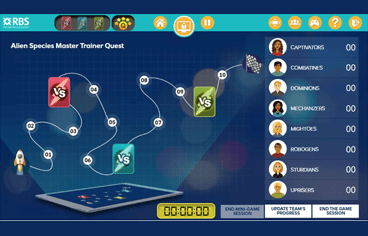
Classroom-based Gamified Learning Programs for New Hires
Badges & Leaderboards to Boost Collaboration and Knowledge Retention

Classroom-based Gamified Learning Programs for New Hires
Badges & Leaderboards to Boost Collaboration and Knowledge Retention

- Home
- Case Study
- RBS – Classroom-based Gamified Learning Programs for New Hires
Share This Post
Share This Post
Facebook
LinkedIn
Twitter
Latest Case Studies

Overview
Royal Bank of Scotland (RBS) is one of the reputed retail banking subsidiaries of The Royal Bank of Scotland Group plc., together with NatWest and Ulster Bank.
- Client :
- RBS
- Category :
- Service Case Study
- Industry :
- BFSI
Business Requirements
- Client wanted to adopt an engaging classroom-based approach to train the new hires.
- The need to gain optimal employee engagement during the onboarding program.
- The need for employees to understand the overall working of India Technology division.
Challenges
- Classroom training sessions were boring and less interactive.
- There was lack of motivation and collaboration among the employees.
- Learners were unable to retain knowledge within a classroom setting.
Our Solution
- Game-based learning approach within a classroom setting was adopted.
- It helped to address the customized learning needs of the intended audiences.
- Mini games and Quizzes enhanced the overall employee participation and workplace efficiency.
Benefits
- Gamified instructor-led instruction catered to the training needs of new hires.
- Rewards & Badges helped to reinforce the learning experience.
- Employees actively participated to track their workplace growth and performance.
- The aim to reach the next level raised the feeling of competition among the employees.
- Overall, 9 themes were introduced within the game which could be randomized as per the varied learning preferences.
- Buzzer rounds (league matches), extra multiple choice or scenario-based questions provided an opportunity for learners to earn bonus points and be in the game again.
- Gamified classroom learning improved collaboration between the players from different teams, leading to increased learning efficiency, team building and workplace productivity.
- The interactive interface of the game helped participants view their individual scores, track performance, and boost learning uptake.

Overview
Royal Bank of Scotland (RBS) is one of the reputed retail banking subsidiaries of The Royal Bank of Scotland Group plc., together with NatWest and Ulster Bank.
- Client :
- RBS
- Category :
- Service Case Study
- Industry :
- BFSI
Business Requirements
- Client wanted to adopt an engaging classroom-based approach to train the new hires.
- The need to gain optimal employee engagement during the onboarding program.
- The need for employees to understand the overall working of India Technology division.
Challenges
- Classroom training sessions were boring and less interactive.
- There was lack of motivation and collaboration among the employees.
- Learners were unable to retain knowledge within a classroom setting.
Our Solution
- Game-based learning approach within a classroom setting was adopted.
- It helped to address the customized learning needs of the intended audiences.
- Mini games and Quizzes enhanced the overall employee participation and workplace efficiency.
Benefits
- Gamified instructor-led instruction catered to the training needs of new hires.
- Rewards & Badges helped to reinforce the learning experience.
- Employees actively participated to track their workplace growth and performance.
- The aim to reach the next level raised the feeling of competition among the employees.
- Overall, 9 themes were introduced within the game which could be randomized as per the varied learning preferences.
- Buzzer rounds (league matches), extra multiple choice or scenario-based questions provided an opportunity for learners to earn bonus points and be in the game again.
- Gamified classroom learning improved collaboration between the players from different teams, leading to increased learning efficiency, team building and workplace productivity.
- The interactive interface of the game helped participants view their individual scores, track performance, and boost learning uptake.
Share This Post
Facebook
LinkedIn
Twitter






